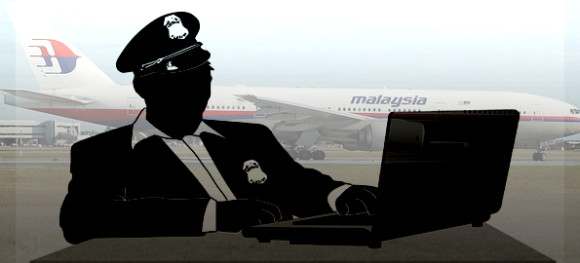AMIDST the blaze of media reports on the ill-fated MH370 plane, a statement by the Royal Malaysian Police on 22 March 2014 slid by largely unnoticed. The Inspector-General of Police (IGP) announced “a new initiative by the police to take on a more proactive role in curbing and detecting misuse of the internet, particularly in social media”. According to media reports, the police will be setting up the Cyber Investigation Response Center (CIRC), under the ambit of the Commercial Crime Investigation Department.

IGP Tan Sri Khalid Abu Bakar justified the plan on the basis that the internet was being exploited to “defame individuals and the government”. At the same time, the Malaysian Communications and Multimedia Commission (MCMC) reminded internet users not to upload, spread or update status that were speculative of MH370. Was the IGP’s statement also a response to the flurry of social media activity surrounding the tragedy of the Malaysia Airlines (MAS) plane?
While the social media content about MH370 may provide some context to the state’s new plans to police the internet, the implications extend beyond videos of a bomoh going viral and tasteless spoof ads about MAS.
Proactive or reactive?
It is unclear to what extent the police will go in “monitoring social media websites” via the CIRC unit. Will they be proactive and high-tech, deploying powerful social media “listening” software that can scrape the whole of Facebook, Twitter and Google+ for mounds of data on a particular key word? Or will they adopt a more reactive approach, waiting till someone files a police report or sends them a screenshot of a status update or Tweet that is defamatory or falls into the broad, all-encompassing category of “misuse of the internet”?
Even if automated social media listening software is used, it would still require “humanware” – namely, analysis and interpretation. And if the low-tech approach is going to be used, is it practical use of police resources to have officers spending hours on Facebook and Twitter? Already strained police resources should surely not be devoted to monitoring social media for activity that isn’t necessarily criminal.
Dealing with defamation
The IGP indicates that the unit’s formation is further motivated by the “exploitation of the internet to defame individuals or the government”.
Since civil defamation laws already exist in this country, why do the police need to spend their time and expertise defending reputations? Shouldn’t it be left to the parties who feel defamed to pursue civil action under the Defamation Act 1957? Indeed, that has been the conventional route that most parties take.

The Malaysian Penal Code also provides for the offence of criminal defamation under Section 499. And one reason to pursue criminal defamation would be to capitalise on the penal nature of Section 500, which provides for imprisonment of up to two years or a fine or both. But the question remains: is going to prison a just and commensurate punishment for insulting, criticising or making fun of someone, including those who hold public office?
Chilling digital chatter
We’ve already seen how the state relies on sedition laws to nab those who voice out their opinions against the political status quo. For example, in June 2013, the police nabbed Melissa Gooi for a Facebook post that allegedly insulted the King.
With the IGP’s announcement, it would seem that the state is determined to pour even more resources into catching and criminalising individuals who may have a different opinion from mainstream political thinking. At this rate, keeping an open and public Facebook profile and Twitter account is rapidly going to be a thing of the past in Malaysia.
As social media listening tools operate most effectively on public profiles and cannot access private profiles, learning how to set your status update accordingly will become an imperative. Thankfully, Facebook allows you to create customised lists for your updates and status.
Given the route Malaysia is taking vis-à-vis policing the internet, it would also be timely to be more circumspect about who you “friend” on Facebook. All it might take for the CIRC to begin scrutinising you is a new acquaintance who takes offence at your status update and e-mails in a complaint.
Gen Y Malaysians who grew up without the fear of idle talk or critical comments getting them into hot soup may now have to change their social media behaviour. From what has been announced, the CIRC’s focus is on “misuse of the internet”. And the type of offences that the CIRC will investigate could be anything from “spreading rumours” to “incendiary remarks”. But without clear definitions about what these are and how they can be considered criminal, sharing a meme on kangkung or a parody about the prime minister or his wife could be enough to attract a police investigation.
As it is, there are already signs that right-wing groups will demand for criminal sanctions against those who speak their mind about the government of the day or the current crop of political leaders we have.

Let’s have clarity
The media frenzy surrounding the mystery of MH370 has indeed brought out the worst of internet and social media users, from spoof ads that are in poor taste but nonetheless harmless, to identity-compromising phishing videos. But it also serves as a great test bed for determining what constitutes “misuse of the internet”.
Phishing and malware videos clearly have malicious intent and cause damage, and these should rightly be criminalised. But should tasteless spoof ads, critical tweets about the government’s handling of the tragedy or mocking memes be regarded in the same light?
Spoof ads done in bad taste deserve to be deplored. Criticism in poor form deserves rebuttal. But none of these deserves to be criminalised or subjected to investigation by one of the most powerful organs of the state. That the state would deem it necessary to do so should raise alarm bells for all of us. ![]()
Bernice Low is a former blogger for CNET Asia. When not skewering someone in her blog, she’s busy dreaming up Hollywood blockbuster movies in her other life as a screenwriter.


neptunian says
It will be like the printed media policing – Pro-govt e-news / blogs etc can write whatever they want, but any criticism of the govt will result in a “sedition” charge.
Even darker days ahead.
Sunna Sutta says
“Will they be proactive and high-tech, deploying powerful social media “listening” software that can scrape the whole of Facebook, Twitter and Google+ for mounds of data on a particular key word?”
The Malaysian government is already in possession of a powerful social media “listening” software called FinFisher (aka FinSpy). This surveillance software which was developed and marketed by UK-based Gamma International is sold only to governments, among which are some of the most repressive regimes in the world. Read all about it and download the whistle-blowing report by The Citizen Lab at:
https://citizenlab.org/2013/04/for-their-eyes-only-2/
Be warned; no private social media profile is safe from FinFisher!
zamorin says
We all know how neutral this targetting (I mean monitoring) is going to be.